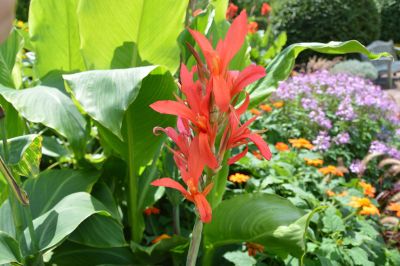Take a look at these ideas for planning an exotic garden in cold weather.
Creating an Exotic Cool Climate Garden
Foliage is all important in a tropical garden. Look for hardy “exotic” plants with bold foliage in a variety of colors, textures, and sizes. Include a variety of annuals in your display of hardy tropical looking plants. Add a water feature too. It doesn’t have to be big and “splashy,” but some type of water feature, even a bubbling bird bath, will provide authentic sounds of a tropical garden. Plant hardy, tropical looking plants in dense layers. If you look at pictures in a real tropical garden, you’ll notice plants growing in varying heights. To capture this feeling, consider groundcovers, trees, shrubs, and grasses along with annuals and perennials of various sizes. Hanging baskets, containers, and raised beds can help. Accent your exotic, cool climate garden with vibrant colors. Gentle pastels and soft colors aren’t typically a feature of a true tropical garden. Instead, contrast green foliage with blooms of hot pink and bright reds, oranges, and yellows. Zinnias, for instance, are available in a variety of vibrant colors.
Hardy Tropical-Looking Plants
Here are some types of hardy exotic plants for chilly climates that work well:
Bamboo: Some types of bamboo are tough enough to withstand chilly winters in USDA plant hardiness zone 5 through 9.
Japanese silver grass: Japanese silver grass is lovely and provides a tropical appearance for an exotic garden in cool weather. It is suitable for USDA zones 4 or 5.
Hibiscus: Although it has a reputation as a hothouse flower, hardy hibiscus cultivars can tolerate chilly winters as far north as USDA zone 4.
Toad lily: A shade loving plant that provides exotic pink blooms in late summer and early autumn, toad lily is hardy to USDA zone 4.
Hosta: This exotic looking perennial is ideal for shady spots, and most types of hosta are suitable for growing in USDA zones 3 through 10.
Canna lily: A colorful plant with an exotic appearance, canna lily is suitable for USDA zones 6 or 7. If you’re willing to dig the rhizomes and store them during the winter, you can also grow them in climates as cold as USDA zone 3.
Agapanthus: Beautiful but tough as nails, agapanthus is practically indestructible in nearly any climate. The blooms are a unique shade of deep blue.
Yucca: You may think yucca is strictly a desert plant, but many cultivars are hardy enough for USDA zones 4 or 5 and above. Beaked yucca (Yucca rostrata) or small soapweed (Yucca glauca) are good examples.
Palms: With a little winter protection, there are actually a number of palm trees that can survive chilly temps. These are excellent additions to an exotic looking tropical garden.
